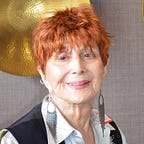Dr. Estelle Ramey Dauntlessly Mounts the Feminist Barricades
One man tells her she should be whipped for her audacity. “And you are the kind of a woman who wants to be whipped,” he added.
WASHINGTON, 1971: Elliot Richardson, Secretary of the Department of Health, Education and Welfare, may have opened a Pandora’s Box when he authorized a Women’s Action Program to assist him “in meeting my commitments to women in HEW.”
The Parkland branch’s first speaker, Dr. Estelle Ramey, told an audience of about a hundred budding feminists yesterday, “It’s a damn good thing I don’t apply to Food and Drug Administration (FDA). With my advanced chemistry degree and if I was a good girl, I might possibly have been a GS-13 in 25 years.”
Instead, Dr. Ramey is a professor physiology and biophysics at Georgetown Medical School and, in the last year, since she took issue with Dr. Edgar Berman’s contention that “women’s raging hormonal imbalance makes them unfit for top jobs,” she has been in great demand as a speaker on the women’s movement.
Dr. Ramey proceeded to recite chapter and verse from statistics that showed that women’s place at HEW is mostly at the bottom.
“Of 191 food and drug office positions, six are held by women. In grades GS-15, 16 and 17, there are no women, zero women. Out of 650 inspectors, only 16 are women,” she said, calling the figures “outrageous.”
She thinks maybe women are especially suited to being FDA inspectors because “a women is deeply concerned about the quality of food and drugs for her family. She’s the one who squeezes the tomatoes.” But when it comes to being an inspector, “squeezing the tomatoes becomes a male skill.”
Dr. Ramey says the argument that women are physically unfit for such work won’t hold up.
“We are fragile and delicate only in job descriptions. At home, we have to have the strength of a horse.” She thinks that women might also bring a special dimension to personnel jobs because “in dealing with her children and her husband, a woman has developed a sensitivity to other human beings.” Yet there are only three women at GS-13 in personnel.
Before Dr. Ramey locked horns with Dr. Berman, she considered herself “a conservative, middle-class woman, the kind the ads are aimed at. I worried about dishpan hands.” Now she is out on the barricades and gets offers to speak all over the country as well as in Japan, West Germany and India (for the moment, she’s not going abroad to spread the gospel).
She noticed some changes.
“Women at cocktail parties aren’t hostile to me anymore. Middle-aged women like me come and say, ‘I didn’t have a chance, but I’d like my daughter to have it another way.’”
But men, are if anything, more hostile. After Dr. Ramey wrote an article for McCall’s magazine on the biologic hazards of being a male, a surgeon at Georgetown who had always been pleasant told her that if he was her husband, he would have whipped her for writing it.
“And,” the man continued, “You are the kind of woman who wants to be whipped.”
Dr. Ramey shrugs it off. She has learned, she says, that being a feminist means not everyone’s going to like you. Men, she believes, are threatened because women want to become their intellectual equals. Are women the intellectual equals of men? “The answer in our society,” Dr. Ramey says without rancour, “is a flat no.”
[This article originally appeared in The Washington Daily News, 1971 as Too Few Jobs, Too Low Ratings, #42 in a collection of more than 100 newspaper articles by Judy Flander from the second wave of the Women’s Movement reflecting the fervor and ingenuity of the women who rode the wave.]
